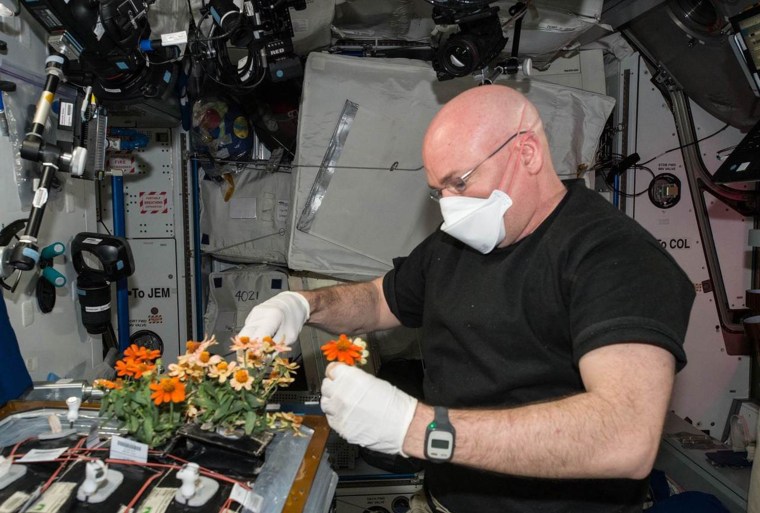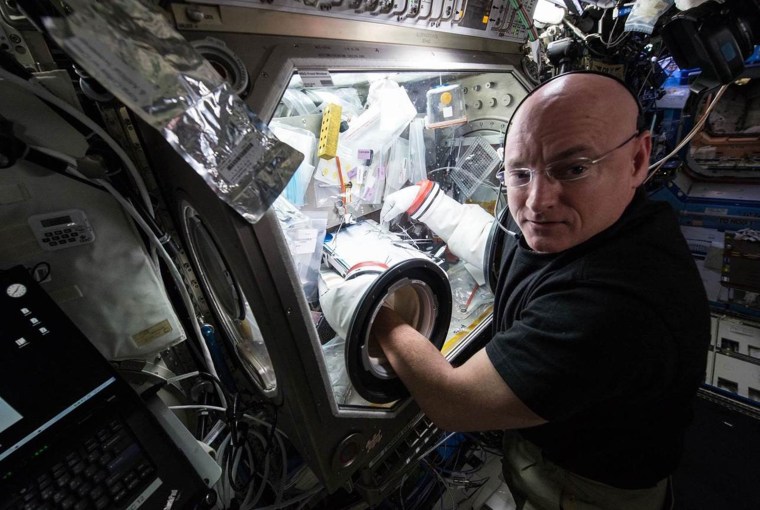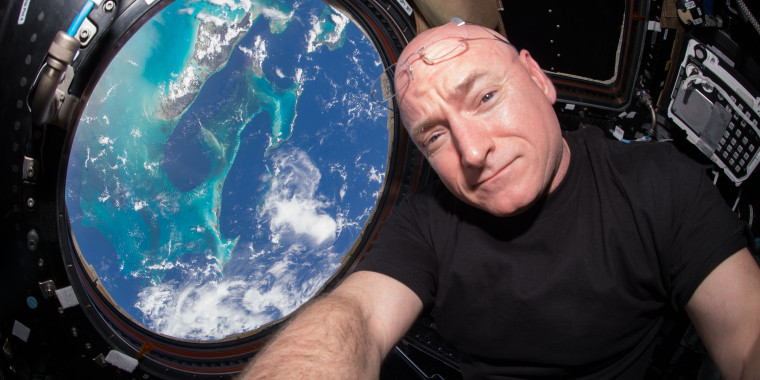For almost a year, Scott Kelly only saw his family on a video screen, couldn’t go outside without special gear and guarded against the health dangers lurking outside his home’s walls.
Sound familiar?
The retired NASA astronaut spent 340 days on the International Space Station before returning to Earth in March 2016. Life now often takes him back to life then.
Kelly lives in Colorado, but spent the start of the coronavirus lockdown in a high-rise apartment in downtown Houston, Texas, which reminded him of his time in space — including a structured routine and a conscious effort to stay positive.
“There were a lot of parallels, (though) I would say that living in my apartment for a year — if I had to do that versus a year in space — the apartment wins every time,” Kelly, 56, told TODAY.
“I think I learned things in space that helped me and I think it can help people in this situation.”
Indeed, many are struggling.
Two-thirds of adults report experiencing social isolation — defined as having few relationships and rare contact with others — and high levels of anxiety since the beginning of the pandemic, according to a new survey conducted by the AARP Foundation in collaboration with the United Health Foundation.
Only 11% of adults sought help from a medical professional when feeling down, and almost a third of those over age 50 said they didn’t look to anyone for support.
Experts called it a widespread public health crisis.
“COVID-19’s magnification of social isolation could have long-term consequences for the health and well-being of millions of people in the U.S.,” said Lisa Marsh Ryerson, president of the AARP Foundation, in a statement.
“Older women are among the most vulnerable to social isolation… many are caregivers who tend to focus more on others and less on themselves.”
Kelly — who is a spokesman for Connect2Affect.org, an AARP Foundation website that offers tools for assessing social isolation and getting support — shared some of the lessons he learned in space he believes can apply now.
Think of this as a common mission
It's important to have the right perspective, Kelly said. The mission for humanity right now is to work together to get through the pandemic with as little damage as possible.
“We trust each other. We trust the experts. We listen to the sound advice of reliable sources of information and we recognize that, like in space, our personal performance doesn't only affect us as individuals — it affects everyone else,” he noted.
“It's probably one of the few things that I can recall in my lifetime that should bring everyone together in a joint response and try to do this the right way for the right reason.”
Have a structured routine
Kelly followed a strict schedule in space that covered almost every minute of his time on the station. Such daily routines provide a sense of purpose, help people focus on the task at hand and allow an escape from uncertainty, experts say.
Kelly still follows a schedule, though he tries to make the weekends much different than the work days.
“I found in space it's so easy when you're in the same place all the time to let the days just run into one another and be very similar,” he said. “You need something to look forward to and I think looking forward to the weekend is very helpful from a mental health perspective.”
Keep a journal
Don’t treat it as a “a ship’s log” to list the day’s events, Kelly advised, but rather a record of how you’re feeling.
“I found it to be a cathartic process of sharing my feelings with myself,” he said. “It’s mentally beneficial.”
Go outside
Kelly missed Earth’s green landscapes and the ability to go outside more than he expected while in space, so much so that the flowers he grew on the space station became less of a science experiment and more of a delight the longer he was on the station. When the crew gathered for a communal dinner on Friday nights, he’d Velcro the flowers to the middle of the table as a centerpiece.

“It was awesome to have a little flower sitting there while you're eating,” he recalled. “Occasionally, I took the flower out into the cupola, where we have a lot of windows, to give it some natural sunlight, almost like it was a pet.”
Exercise
Astronauts have to exercise as part of their job to prevent bone and muscle mass loss in microgravity, so Kelly worked out two-and-a-half hours a day, six days a week.
He still tries to do cardio and resistance training every day, knowing how much it benefits mental and physical health.
Seek mental health help
In space, Kelly had to talk with two psychiatrists and two psychologists every two weeks, discussing his stress levels and how he was getting along with his crew mates. He was skeptical at first, but soon realized how helpful it was to have a mental health professional to put things in perspective.

Resolve conflicts before they get big
Living in close quarters with his crew mates for almost a year, Kelly learned to talk about issues in a positive, timely way. The perfect crew member does 51% of the shared responsibilities — just a little bit more than what's fair and equitable, he said.
Understand this will someday be over
When Kelly started his year-long stay at the space station, he couldn’t see the end from the beginning. He had to keep reminding himself: This is my reality now and this is how I'm living.
He approaches the pandemic with the same attitude.
“We don't know when this is going to be over,” he said. “My plan is to take this day by day and understand that someday it will be over and it will be great — like coming back to Earth after being in space for a year.
For Kelly, that meant the ability to travel — before the pandemic — and experience close up some of the beautiful places he saw from the station, like Everest base camp in the Himalayas, where little lakes on the northern side of the mountain range looked like little emeralds from space.
“Getting your freedoms back, your ability to do what you choose is going to be an incredible experience,” he said.



